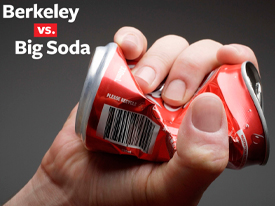 On Tuesday July 1, the Berkeley City Council voted unanimously and enthusiastically to place a soda tax measure on the November 2014 ballot. If voters approve the measure in November, Berkeley would be the first US city to tax sugar-sweetened drinks.
On Tuesday July 1, the Berkeley City Council voted unanimously and enthusiastically to place a soda tax measure on the November 2014 ballot. If voters approve the measure in November, Berkeley would be the first US city to tax sugar-sweetened drinks.
BeyondChron published an article busting the beverage industry’s myth that a soda tax is “the last thing Berkeley needs.” In the article, champions of the soda tax campaign, including our Executive Director Martin Bourque, offered their responses to common claims made by Big Soda. Misleading voters is the only tactic the opposition has against a popular, community-led campaign that aims to improve health. That’s why this article and others in the “Soda Tax Myth” series at BeyondChron is an important read, for voters on both sides of the Bay. Meanwhile, the campaign in Berkeley is moving forward, read on for our press release about the milestone at the City Council meeting .
The proposed measure is a one-cent-per-ounce general tax on distribution of high-calorie, low-nutrition beverages like sodas, sports drinks, energy drinks, sweetened iced teas, and the syrups used to make fountain drinks. It does not apply to milk products, infant formula, and natural fruit and vegetable juice.
Two independent polls have found broad support for Berkeley’s soda tax, with almost two-thirds of Berkeley voters in favor. The measure has garnered endorsements from a fast-growing list of local organizations, businesses, and community leaders, including the Berkeley Chapter of the NAACP, Berkeley Federation of Teachers, Berkeley Council of Classified Employees, Ecology Center, Berkeley Dental Society, Physicians for Social Responsibility, Berkeley Natural Grocery, The Public Health Institute, author Michael Pollan, and Lifelong Medical CEO Marty Lynch. A recent UCLA study found the highest support for soda taxes among people of color, low-income residents, and Spanish speakers.
Berkeley’s soda tax measure would establish a Sugar-Sweetened Beverage Product Panel consisting of experts in the areas of public health, child nutrition, nutrition education, and food access programs. The panel’s purpose is to advise the City on how and to what extent they should fund programs designed to reduce sugary drink consumption and address the health consequences of their consumption.
“The evidence shows that sugar-sweetened beverages are more strongly linked to chronic disease risk than any other thing we eat or drink,” says Dr. Patricia Crawford, a UC Berkeley nutrition expert. The Institute of Medicine recently reported that 20% of the population weight increase in the United States between 1977 and 2007 is attributed to sugar-sweetened beverages alone. According to the Centers for Disease Control, one third of all Americans born in 2000 and almost half of African Americans and Latinos born in 2000 will develop diabetes within their lifetimes.
“Berkeley wants a better future for our kids and our health,” says Berkeley Unified School District Board President Josh Daniels. “A future where one in three kids ends up diabetic is unacceptable. The soda tax measure is an effort to make sure that future never occurs.”




I can prove drinking milk after a person is 18 is worse. Tax milk when sold to an adult.
Parents with young children who bring a notarized letter to the market and can pass a lie detector test ate POS are exempt.